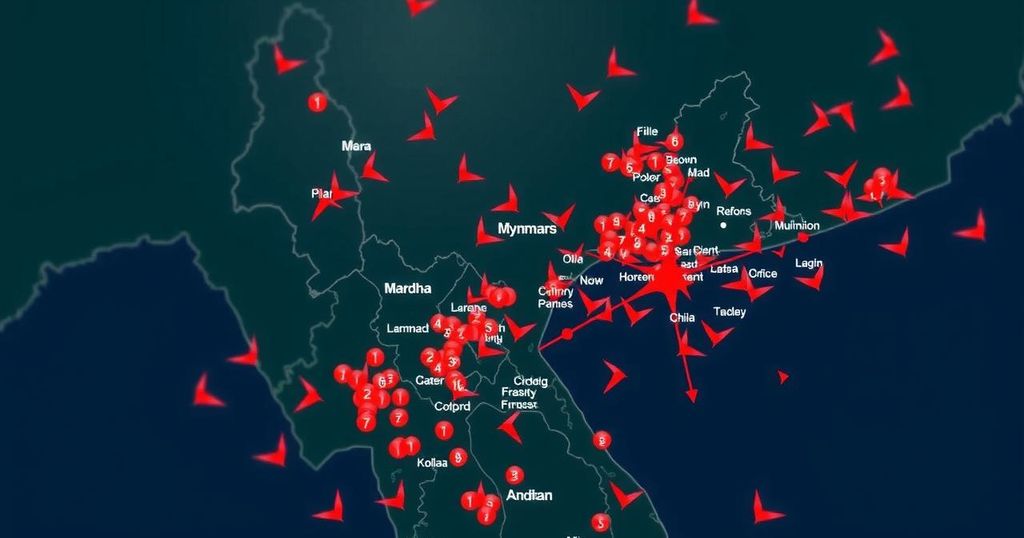Politics
ASIA, BEIJING, BURMA, CHINA, CMEC, DEFENSE, GEOPOLITICS, INTERNATIONAL RELATIONS, ISEAS, ISEAS - YUSOF ISHAK INSTITUTE, JASON TOWER, KY, KYI, KYI SIN, MANDALAY, MEXICO, MYANMAR, NATIONAL SECURITY, NORTH AMERICA, SOUTH CHINA SEA DISPUTE, TAGAUNG TAU, UNITED STATES INSTITUTE OF PEACE
Omar El-Sharif
China’s Joint Security Proposal in Myanmar Raises Sovereignty Concerns
China’s recent proposal for a joint security company with Myanmar’s military junta has sparked controversy over potential violations of national sovereignty and the junta’s security capabilities. Prompted by growing instability, the proposal underscores Beijing’s proactive approach to safeguarding its interests in the region. Observers highlight the junta’s diminishing control over security, with rising opposition forces contributing to a complex and evolving political situation in Myanmar.
China’s joint security proposal for Myanmar, aimed at forming a cooperative security entity with the military junta, has incited considerable debate regarding issues of national sovereignty and the junta’s capability to maintain security independently. A report from the Myanmar Gazette on November 8 indicated that a committee, established by the junta to assess the proposal, has begun drafting a memorandum of understanding, emphasizing the need to safeguard Myanmar’s sovereignty while enhancing security measures. Observers speculate that this proposal was driven by the recent bombing of China’s consulate in Mandalay on October 18, which stirred concerns within Beijing about the safety of its investments in a politically unstable Myanmar. According to a Myanmar scholar, China’s primary concern in Myanmar revolves around ensuring stability for its Belt and Road Initiative projects. The scholar noted that the inability of the junta to control dissent has necessitated alternative strategies from Beijing, particularly as the 2008 Constitution limits foreign troop deployments. The reference to a ‘joint security company’ was viewed as a tactical effort to circumvent accusations of direct military involvement, albeit raising public apprehensions about infringements on national sovereignty. This situation reflects a lack of confidence from China regarding the junta’s security capabilities. Chinese infrastructure initiatives, particularly those tied to the China-Myanmar Economic Corridor, have encountered heightened threats following the declaration of a “People’s Defensive War” by opposition groups in 2021. Reports highlight incidents such as the attack on the Tagaung Taung nickel-processing facility, exemplifying the risks faced by Chinese projects. Further analysis indicates that the junta shows signs of diminishing control, particularly illustrated by the attack in Mandalay, which raises significant questions about the security efficacy of the military regime. China’s strategy in Myanmar has had to adapt as the junta’s influence wanes. While Beijing has historically provided support to the junta, it also engages with various ethnic armed groups and opposition factions to protect its strategic interests. Chinese military assistance, including combat aircraft supplies, signals an increasing concern regarding the junta’s authority. However, this intervention has received backlash from local citizens, complicating China’s diplomatic stance in the region. Experts, including security analyst Abdul Rahman Yaacob, underscore the junta’s overstretched military resources, which hinders its capacity to provide comprehensive security across different conflict zones. Nayacob also pointed out a notable shift in conflict dynamics as opposition forces operate closer to urban centers, targeting government assets more effectively. A potential establishment of a Chinese security framework could introduce further complications into Myanmar’s complex political landscape. Experts caution that while China’s intervention in Myanmar could be intended to stabilize the region, it risks estranging both the local populace and regional stakeholders, such as India, due to perceptions of increased foreign influence. The long-term economic interests of China must be carefully balanced against the immediate requirements of supporting the junta amid growing unrest and conflict.
The context of China’s proposal to establish a joint security company in Myanmar arises amid growing concerns about national security and sovereignty following the ongoing conflicts since the military coup in 2021. The junta’s inability to maintain control over various regions has raised alarms, prompting Beijing to rethink its strategy in the country. The proposal echoes a larger trend of international interest in Myanmar’s political stability, especially concerning China’s investments and the broader implications for regional dynamics.
In conclusion, China’s proposal to form a joint security company with Myanmar reflects deepening concerns about the junta’s ability to maintain order amid rising opposition and instability. This proposal raises questions about national sovereignty and the implications of foreign involvement in Myanmar’s internal affairs. Experts warn that while China’s increased engagement may aim to stabilize its investments, it risks alienating both the populace and regional powers, ultimately complicating the already intricate political landscape of Myanmar.
Original Source: www.voanews.com








Post Comment